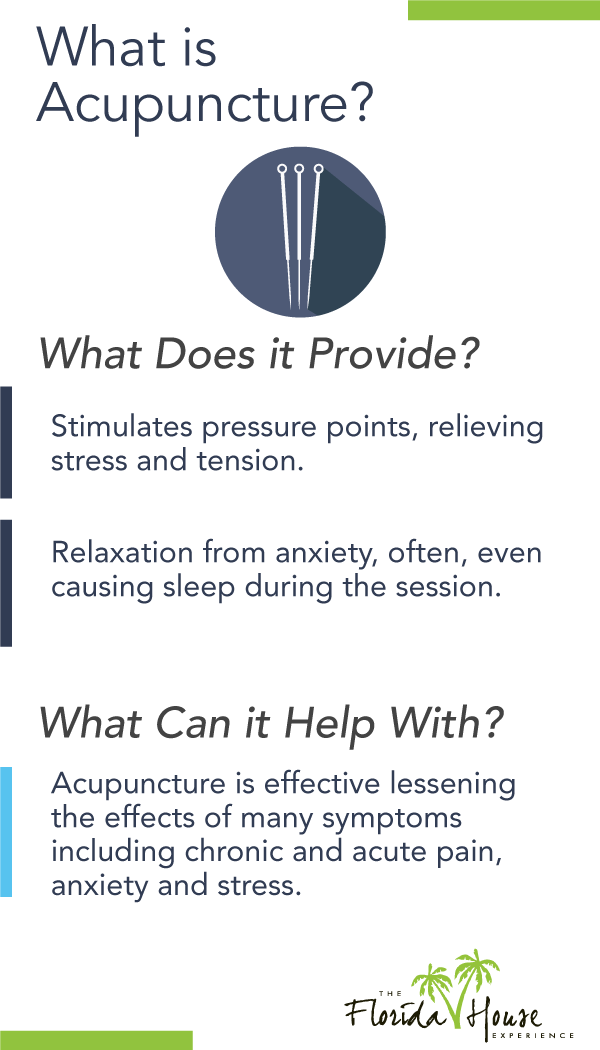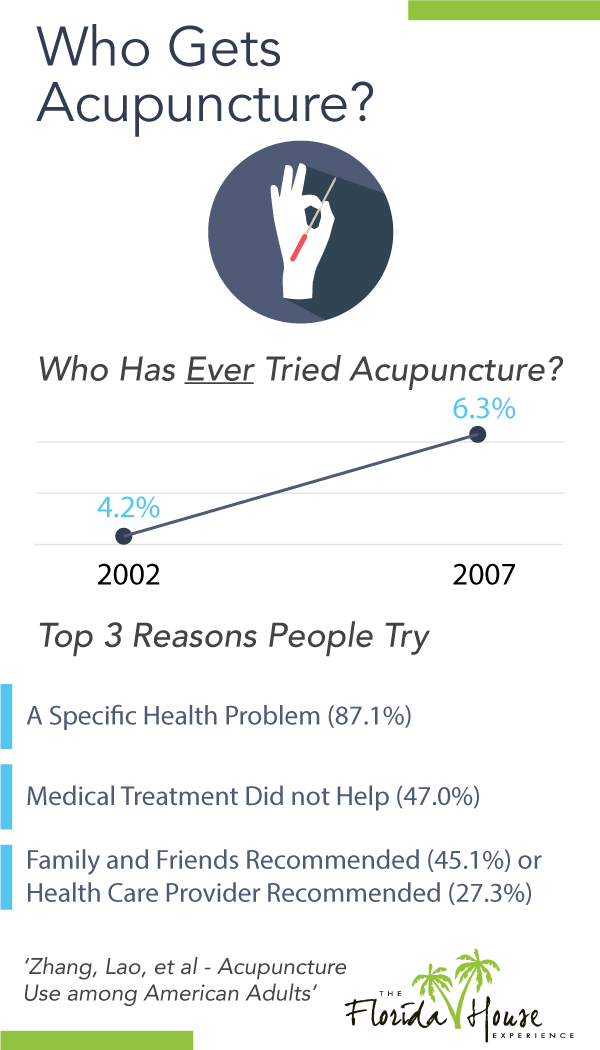At FHE Health, our goal is to treat substance use and mental health disorders with a wide range of tools so that we can personalize a treatment plan for each individual patient who comes to us for help.
To meet this goal, we incorporate a wide range of different treatment methods, from standard services like counseling and cutting-edge therapy to positive, holistic and naturopathic treatments aimed at building overall wellness, like massage, art, and music.
One of these therapies that we offer to patients at FHE struggling with addiction or mental health disorder is acupuncture. We’re proud to have leading practitioners in a number of holistic treatments at our facility with the aim to make your experience with us valuable as possible.
What Is Acupuncture?
 Acupuncture involves the placement of thin needles in the skin at strategic points and has roots in ancient Chinese medicine. Long believed to treat pain and other physical and mental disorders, ancient Chinese practitioners believed illnesses and conditions were the results of a disruption in the body’s chi or natural energy flow.
Acupuncture involves the placement of thin needles in the skin at strategic points and has roots in ancient Chinese medicine. Long believed to treat pain and other physical and mental disorders, ancient Chinese practitioners believed illnesses and conditions were the results of a disruption in the body’s chi or natural energy flow.
How Does Acupuncture Work?
By creating new pathways — also known as meridians — with needles stuck gently into the skin, the goal was to restore the body’s energy, correcting the issue being treated.
Today’s acupuncture practitioners don’t always use this line of thought when talking about the value of acupuncture. In modern uses, acupuncture can be used to contact pressure points, and stimulate muscles and nerves throughout the body.
What Is Acupuncture Used to Treat?
Acupuncture is widely accepted as an integrative treatment for pain, both chronic and acute. This is helpful in our South Florida rehab center because most facilities treat short and long-term pain with opioids, which are extremely addictive. If a person is coming to FHE Health for addiction treatment, treating pain through non-addictive means is conducive to recovery.
Pain isn’t the only thing acupuncture is used to treat, however. Other common conditions treated with acupuncture and other Traditional Chinese Medicine (TCM) are, according to the Mayo Clinic:
- Stress-linked mental disorders like anxiety and depression
- Post-traumatic stress disorder (PTSD)
- Substance abuse disorders and addiction
- Nausea and vomiting related to chemotherapy
- Menstrual cramps and labor pain
Does Acupuncture Work?

The scientific and medical communities agree that acupuncture can provide real relief to a list of medical, behavioral and psychiatric conditions. In 1996, the World Health Organization adopted acupuncture into its knowledge base, recording clinical studies on the treatment and creating a list of 64 (at the time) conditions that acupuncture is able to relieve or lessen in some patients.
Like many treatments in the TCM category, acupuncture has been shown to provide real relief for a number of pervasive conditions. Here are some examples:
Acupuncture for Depression and Stress
Acupuncture can be very calming once a patient is used to it, so much so that many patients experience falling asleep during treatment sessions. Inherently, acupuncture is therapeutic for patients, offering a reduction in daily stress, which can play a large role in other mental diseases.
When counseling for depression is combined with acupuncture, there’s a reason to believe that this treatment is more effective than counseling alone.
Acupuncture for Other Psychiatric Diseases
Similar results have been found for other psychiatric conditions, such as PTSD and Generalized Anxiety Disorder (GAD). In one study, a patient who suffered from both reported an enhanced quality of life after receiving acupuncture targeted at her mental illness.
Acupuncture for Chronic Pain
As mentioned, treatment for chronic and acute pain is the most widely recognized use for acupuncture. Using the practice in this way has been so effective that as mentioned above, some physicians are using acupuncture as a replacement — or at least a way to wean patients off faster — for opiates in treating pain.
Acupuncture for Addiction
We’ve already discussed the use of acupuncture as a replacement or supplement for addictive pain medications, but the link between acupuncture and addiction actually goes much deeper. Mainly, acupuncture has the potential to stimulate the release of pleasure chemicals in the brain like dopamine, similar to many drugs.
The WHO put substance abuse on its 1996 list of conditions treatable with acupuncture because of the role it can play in acting as a replacement for drugs and alcohol, especially in the early stages of addiction treatment. Since then, a variety of studies have backed up these findings.
Acupuncture for Other Conditions
Some patients and practitioners believe that acupuncture can be used for much more than treating the conditions listed above. For example, anecdotal cases have been cited where recipients of the treatment successfully used acupuncture for weight loss.
What Does an Acupuncture Treatment Entail?

If your treatment plan includes acupuncture, here are some questions you might have before it begins:
Are There Different Types of Acupuncture?
Most acupuncture is done with standard needles without modification, but there are a few other acupuncture modalities that you may come across at our facility or with other practitioners.
One of the most common is a modality called Electro-Acupuncture. In this treatment, needles are used and hooked up to a mild electrical current to add a pulsing sensation to the pressure created by the insertion of the needles.
Some practitioners also use heat to modify the treatment.
What Happens During Acupuncture?
When you arrive for your acupuncture treatment, there are a few things you should expect.
First, the practitioner will use disposable, single-use needles or sterilized needles to comply with regulations and ensure that your health is provided for throughout your treatment.
You’ll lay face up or face down on a comfortable, padded table while the treatment is going on.
Different practitioners have different ways of addressing patients and may do a brief examination of the areas where the pain is occurring, your pulse, and other factors related to the treatment itself.
Acupuncture consists of needle insertion, manipulation, and removal.
Insertion: needles will be gently inserted into various strategic points on the body based on the area of the disease or the specific condition being treated. Practitioners use a map of insertion points to plan a specific session.
Manipulation: treatment then consists of manipulation, using gentle twisting, heat, or electrical currents to modify the sensations and the level of pressure.
Removal: after the session, needles will be removed from the skin.
Does Acupuncture Hurt?
During the first few times you experience acupuncture, you may feel some discomfort or initial anxiety about the fact that the treatment involves needles being inserted into your skin. In the majority of patients, these feelings dissipate with experience. Insertion and removal are generally painless because of the small size of the needles and then shallow nature of the insertion.
Why We Offer Acupuncture at FHE Health
Acupuncture is just one treatment out of a wide variety that we offer as part of our mission to provide a comprehensive, holistic approach to addiction and mental illness. When combined with proven treatment strategies like counseling and group therapy, acupuncture has been demonstrated in numerous peer-reviewed studies to be effective in treating the underlying causes of addiction and mental illness.
When you enter one of our industry-leading recovery programs, we’ll build a treatment plan that meets your needs. To learn more, contact FHE Health today.








